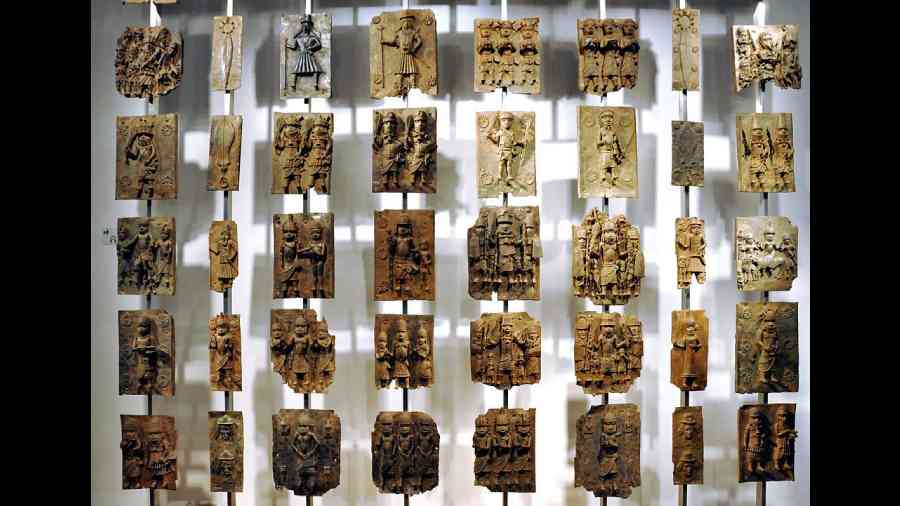According to some estimates, half a million artistic and cultural artefacts originating in Africa are now in museums or private collections in the West. This means that 90% of Africa’s cultural artefacts cannot be viewed by most Africans. On December 20, 2022, Germany handed over 22 Benin Bronzes to Nigeria. France returned some Benin Bronzes in 2021 and museum officials in the United States of America returned over 20 valuable artefacts in October 2022. Berlin has committed to releasing 1,130 Benin Bronzes and other stolen artefacts from German museums.
The Benin Bronzes — these include objects made from ivory, cloth, wood and metals that are not bronze, but more like brass — have come to symbolise Africa’s alienation from its cultural heritage. The organised effort by Nigeria to reclaim these artefacts involves the plan of creating a museum in Benin to be inaugurated in 2025. When British troops stormed Benin City in 1897, the loot it carried away included over 900 commemorative plaques. Despite the heat of battle, the British, clearly aware of the significance of the items, had meticulously labelled each item before expatriating them.
The Benin Bronzes, created by Edo artists, provide a rich record of life in the kingdom of Benin since the 13th century. Benin reached its zenith in terms of its power and influence between 1480 and 1620, becoming a complex urban centre that rivalled European cities of the time. Specialised guilds created metal sculptures that were part of the royal culture. The longevity of the kingdom and the myriad artefacts associated with the Benin court are rare in the African context. Their study and the oral history associated with the objects are of considerable historical significance and challenge notions of Africa’s backwardness.
Cultural artefacts stolen in imperial wars were the foundation for the greatest museum collections in the United Kingdom and Europe. Not surprisingly, the British Museum holds the largest number of stolen antiquities and has been most recalcitrant in repatriating cultural artefacts. As party to the Benin Dialogue Group, the British Museum has agreed to lend some of the Bronzes in its collection for the creation of a permanent display in Benin City. Other European museums will also be lending some of their stolen objects for display at the forthcoming museum.
The partial return of artefacts and the lending of the Bronzes by major museums is part of a process that started half a century ago. In1970, the Unesco Convention on the Means of Prohibiting and Preventing the IllicitImport, Export and Transfer of Ownership of CulturalProperty sought to prevent the illicit trade in cultural property and required State parties to implement measures to seize and return stolen cultural property to the country of origin. While this treaty does not cover the return of antiquities taken before 1970, it also categorically states that it does not legitimise illicit transactions that occurred prior to that time.
The ethical imperative to return stolen goods is resonating across the world. Claims of cultural internationalism — namely that cultural property is not the exclusive domain of a nation but belongs to everybody —and the ‘universal museums’ theory — it declares that objects acquired by museums have become part of the heritage of the museum over time and serve people from every country — form the basis for denying requests of repatriation. But now the cultural nationalism argument, as the ongoing return of the Benin Bronzes indicates, underlines that claiming of cultural objects as an integral part of a nation’s heritage is gaining ground.
The collection of the British Museum is intrinsically enmeshed with the history of slavery and colonialism. As part of the campaign by the Legacy of Slavery Working Party of the Jesus College, University of Cambridge, it recently returned a statue after it had been proved to have been looted from the royal court of Benin. Other collections in the UK are investigating the history of artefacts for restitution. The return of objects is symbolic and part of the larger effort to claim reparations for the ravages of colonialism.
Jael Silliman is a writer of fiction and non-fiction











